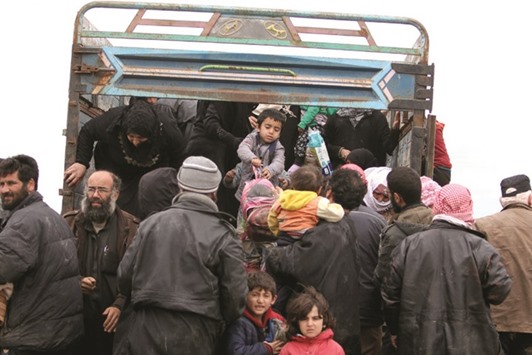In a muddy camp in northern Syria, civilians who fled Raqqa said fear of an expected US-backed assault on the Islamic State group bastion was reaching a fever pitch.
This week, hundreds of civilians escaped Raqqa and headed north to the camp in Ain Issa, in territory controlled by the Syrian Democratic Forces, a US-backed Arab-Kurdish alliance.
As part of their campaign to capture Raqqa, the militants’ so-called “caliphate”, the SDF have been bearing down on the IS-held town of Tabqa and the nearby vital Tabqa Dam over the past 10 days.
Rumours that Syria’s biggest dam would collapse and flood Raqqa, 55 kilometres downstream, have sparked panic in the city.
“The hisbah (religious police) announced over the megaphones ‘the land will be flooded, the Tabqa dam has collapsed,’” said Mohamed Mahmoud, 38.
Mahmoud, his brother and both their families paid $1,000 to a smuggler and fled Raqqa on foot earlier this week.
“I was so afraid, I couldn’t think straight,” he said.
The camp where he has found shelter is home to several thousand Syrians displaced by war, including 400 families who arrived this week from Raqqa.
Children waddled through makeshift pathways between tents emblazoned with the logo of the UN refugee agency (UNHCR), clutching sandwiches and water bottles.
Inside tents, men waited for their turn to have their IS-mandated beards shaved then examined their bare chins in a small mirror. Mahmoud’s face was weighed down by exhaustion, his clothes covered in dust.
He hovered protectively around his elderly mother who sat in a wheelchair, its wheels caked in mud after their arduous 14-hour trek out of Raqqa.
“It’s hell there. Fear rules over everything,” he said as took apparent pleasure puffing on a cigarette, a vice which IS banned when they captured Raqqa in 2014.
“IS is finished now. Most of its fighters fled to Mayadeen or Albu Kamal,” two towns in the oil-rich eastern province of Deir Ezzor, most of which is under IS control. At the entrance to the camp, Kurdish police units — known as Asayesh — searched visibly shaken new arrivals.
Ahmad, a Raqqa native in his 50s, said residents seized the opportunity to flee when they saw IS fighters leave.
“We were no longer afraid to flee Raqqa like before, because IS fighters were less and less visible,” he said, his six children perched atop suitcases packed with their belongings.
Ahmad said the militants “abandoned most of the dams, built tunnels around the city” and protected their positions with sand bags. He said the journey to Ain Issa was traumatic.
“We were so terribly afraid of the air strikes, that the coalition might think we are IS fighters,” he said.

Internally displaced Syrian people who fled Raqqa city get out of a truck at a camp in Ain Issa, Raqqa Governorate, yesterday.
